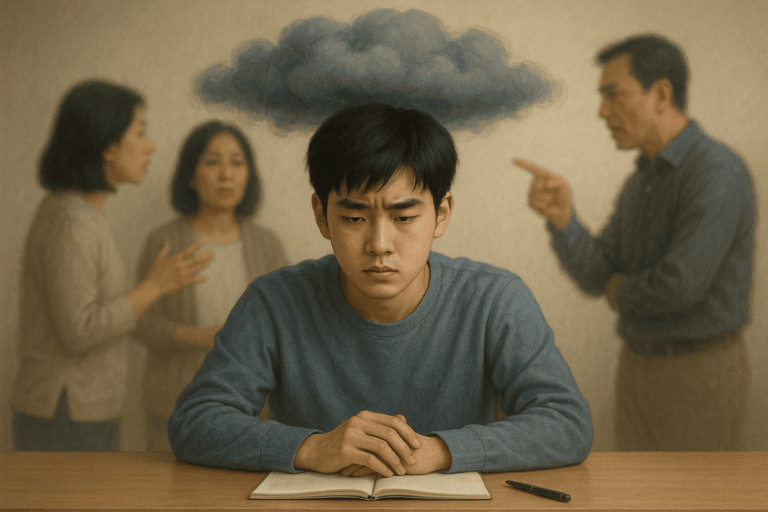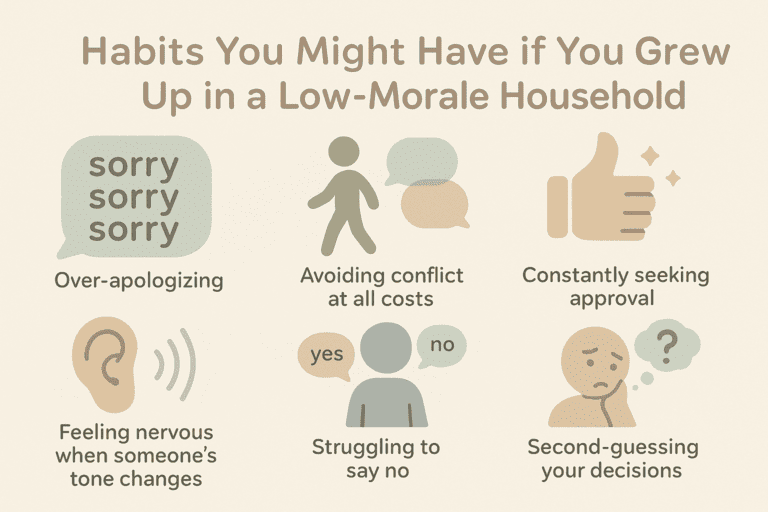When Loved Ones Bring the Morale Down: Navigating Family and Relationship Stress in Asian Homes

As a therapist, I’ve worked with many Asian clients who feel emotionally drained in their own homes. It’s often not the chores, the job, or the pace of life that’s most exhausting—it’s the atmosphere. Certain behaviors from a parent, partner, or family member can quietly bring the morale down, even in households where love and loyalty run deep.
In many Asian cultures, family bonds are deeply valued. There’s respect for elders, a strong sense of duty, and an emphasis on keeping the family together. But these same values can make it hard to speak up when someone’s behavior is hurting you. Over time, these unspoken tensions can bring the morale down so steadily that stress becomes the “normal” way of living.
Common Morale-Lowering Behaviors in Asian Homes
In sessions, I hear clients describe subtle yet powerful patterns that erode peace at home:
Harsh criticism framed as “for your own good”: Comments about appearance, grades, career, or lifestyle choices that undermine confidence.
Comparisons to others: Holding you against the “gold standard” of relatives, siblings, or friends’ children.
Dismissal of emotions: Telling you not to be “too sensitive” or to “stop overthinking.”
Control through guilt or sacrifice: Expecting you to give up personal goals to meet family needs.
Mood unpredictability: The “walking on eggshells” feeling because you never know if a comment will be met with silence, criticism, or anger.
Even when these actions are well-intentioned, their repeated impact can bring the morale down for everyone in the household.
The Cultural Layer of Stress
In Asian families, speaking out against hurtful behavior can feel like breaking a cultural rule. Many clients worry about being seen as “ungrateful” or “disrespectful.” Others feel torn between protecting their mental health and maintaining family harmony.
This pressure often leads to internalizing feelings instead of addressing them. Over time, the silence itself becomes a source of stress—reinforcing the very dynamic that brings the morale down.

Emotional Impact
Living in a household where a loved one brings the morale down can affect more than mood—it can shape self-worth and identity. Clients often describe:
Self-doubt: Feeling like you’ll never be “enough” for your family.
Anxiety: Staying hyper-alert for criticism or conflict.
Low motivation: Losing interest in things you once enjoyed because approval feels impossible.
Isolation: Avoiding friends or hiding parts of your life to avoid family judgment.
In the long run, a morale-draining environment can make you question not only your choices but your value as a person.
Protecting Your Energy While Honoring Your Values
When leaving the relationship or home isn’t possible—or isn’t aligned with your cultural or personal values—there are still ways to protect your emotional well-being.
1. Set Gentle but Clear Boundaries
Boundaries in Asian families may need to be framed respectfully. Instead of a blunt “Don’t say that,” try, “I understand you care, but those comments make me feel discouraged. Can we talk about it differently?”
2. Create Morale-Boosting Habits
Balance the negativity with intentional moments of joy: listening to music you love, connecting with friends who “get” you, or spending time in spaces where you feel free to be yourself.
3. Emotional Separation
Remind yourself that someone’s criticism or mood reflects them—not your worth. Simple reminders like, “This is not mine to carry” can be surprisingly freeing.
4. Seek Support Beyond the Family
Having an outside perspective—whether from a friend, therapist, or support group—can help validate your feelings and offer new coping strategies.

When and How to Address the Behavior
Speaking up can be risky in certain family systems, but in some cases, carefully chosen words can shift the dynamic. Consider:
Is this person likely to listen if you speak gently?
Can you express your needs without shaming them?
Is it safer to use written communication or a mediator?
Sometimes, naming the issue brings clarity. Other times, it confirms that deeper changes—or more emotional distance—are needed to protect yourself.
Final Thoughts
When someone close to you continually brings the morale down, it’s not just a personality quirk—it’s a pattern that can shape your mental health and your future. In Asian families, where cultural values emphasize respect, harmony, and loyalty, addressing these patterns can feel especially complicated.
You deserve a home environment where you can be yourself without fear of constant criticism or disapproval. If you’re feeling worn down by a parent, partner, or relative, therapy can help you navigate the cultural complexities, honor your values, and still protect your well-being.
You are not alone—and you’re not “too sensitive.” Together, we can explore ways to protect your energy, rebuild your confidence, and bring a healthier balance to your family life.
If this feels familiar to you, I invite you to reach out. Let’s have a conversation about what’s been weighing you down, the situations that bring the morale down in your home, and how we can work together to make it feel like a place where you can breathe again. Let’s start creating space for peace, strength, and genuine connection in your life.